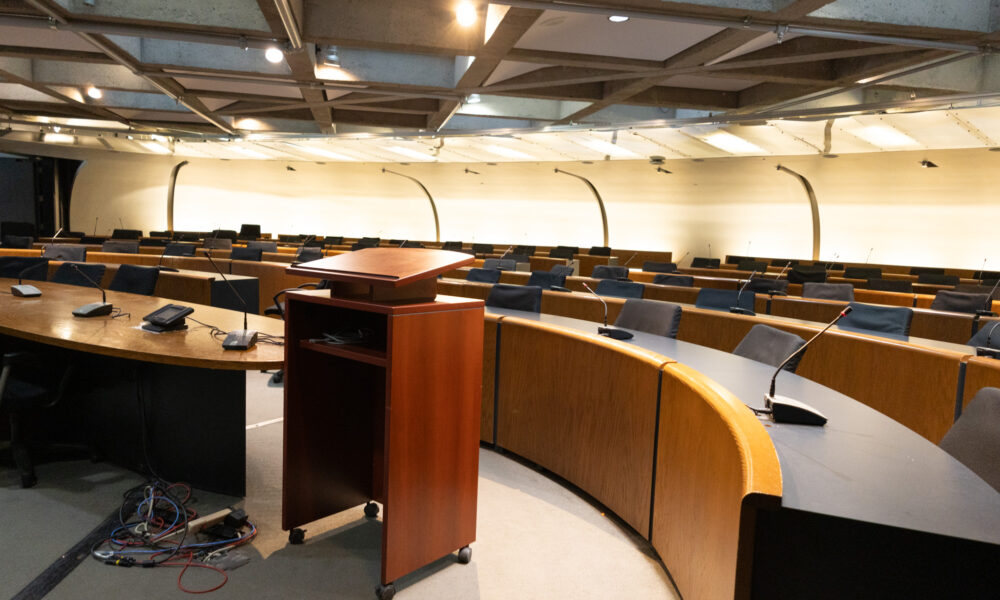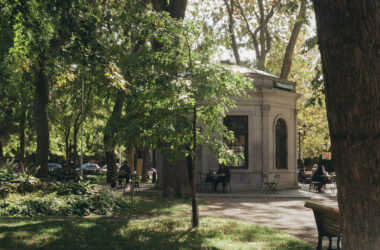The McGill Senate convened on Sept. 17 for its first meeting of the academic year. Central topics of discussion were the Nominating Committee’s decision to remove Professor William Clare Roberts from the Committee on Student Discipline (CSD) because of a post Roberts made on X, and proposed revisions to the Code of Student Conduct and Disciplinary Procedures.
The meeting started with memorial tributes to the late Faculty of Engineering professor emeritus Tomáš J.F. Pavlásek, medicine and health sciences assistant professor Kalonde Malama, and former Faculty of Science professor and director of the Redpath Museum Valerie Pasztor.
The memorials were followed by McGill President and Vice-Chancellor Deep Saini’s remarks on his priorities for McGill’s long-term future: To transform, expand globally, celebrate locally, and unite. He noted that McGill will increase its partnerships and establish centralized campuses around the world.
The Senate then debated whether to remove Roberts from the CSD. The discussion stemmed from a widely circulated post on X in which Roberts wrote, “I used to think BDS (boycott, divest, sanction) was a good idea. I’ve come around, though: nothing short of ‘full economic and military support for Hamas and Hezbollah’ is appropriate.” As both organizations are designated terrorist entities in Canada, the Nominating Committee recommended Roberts’s removal as Vice-Chair of the CSD, citing concerns about perceptions of his impartiality in student discipline cases.
While the Chair of the Nominating Committee and Provost and Vice-Principal (Academic) Christopher Manfredi assured that the Committee was carrying out removal procedures properly, some senators remained unsure.
Catherine Lu, professor in the Department of Political Science, argued that the Committee’s move implied the university’s administration distrusts one of its own bodies, thereby weakening wider confidence in McGill’s institutional procedures.
“I can say clearly that I don’t agree with Professor Roberts,” Lu said. “But as an academic institution, do we want to set the precedent of taking a professor’s extramural remarks about off-campus politics as a reason to impute such a great risk or perceived bias in on-campus administrative proceedings?”
Victoria Kaspi, professor in the Department of Physics and Academic Staff Representative on McGill’s Board of Governors, countered such opposing remarks, saying the Committee had appeared to follow procedure in Roberts’ removal. She added that, given the impact of Roberts’ words, there must be limits to what is acceptable to say.
“In a case where someone is adjudicating something like discipline, bias is so important,” Kaspi said. “I’m not sure how much more bias one could show.”
Senator Susan Aloudat, Students’ Society of McGill University Vice-President of University Affairs, said that she was uncomfortable accepting the decision.
“I feel compelled to speak because I am a student, but also a member of the Nominating Committee,” Aloudat said. “I don’t disagree that it was important to think about these [matters] as a Nominating Committee, but […] the process could have used more diligence.”
The motion to remove Roberts from the CSD was ultimately carried with 42 in favour, 26 against, and 12 abstaining.
Interim Deputy Provost (Student Life and Learning) Angela Campbell next discussed the administration’s proposed changes to the Code of Student Conduct, stressing that reforms made to the Code are not intended to “wield a hammer on students,” but to modernize the Code.
The proposed Code now includes mental-state standards that categorize offences based on intent level. The draft also introduces a “not responsible” pathway—likened in debate to a “non-criminally responsible framework”—allowing the CSD to move serious cases out of disciplinary channels if its members conclude the student could not appreciate the nature of the ‘right-or-wrong’-ness of their actions, without requiring a medical diagnosis as evidence. Some senators pressed on what would justify such findings, highlighting the span of committee discretion that could be allowed.
Structural updates to the Code include shrinking the CSD and Appeal Committee to four members by default, and six on request, thus converting the Committees’ legal assessor into a voting member. The Code also now uses the Canadian civil standard of proof—a balance of probabilities—meaning that conduct is judged to have occurred on a ‘more likely than not’ basis.
The Senate then moved to debate who is permitted to sit on the CSD and its Appeal Committee. The revision to the Code would allow adding an alumni jurist nominated by McGill’s Board of Governors to these Committees, which Víctor Muñiz-Fraticelli, associate professor for the Faculty of Law and associate professor of political science, saw as blurring the line between academic autonomy and Board control.
“Are [Board members] going to be nominating people to take part in what is essentially an academic disciplinary procedure?” asked Muñiz-Fraticelli. “That seems to me to be a radical departure from principles of academic self-governance and [demonstrates], at the very least, a deep mistrust by the board [toward] the very people that function and operate in this university.”
Moment of the meeting: Saini discussed the Sustainability Park, part of the redevelopment of the former Royal Victoria Hospital, describing it as a large interdisciplinary hub intended to connect research and teaching across fields.
Soundbite: “I think there’s a lot of concern about the use of the word ‘celebrating’. [….] We need to acknowledge all of the history that’s been here, not just Quebec, but also the Indigenous history that exists. [….] And I was wondering why that’s not a larger integration as part of this movement.”—Arts and Science Student Senator Chloé Muñoz, on Saini’s priority for McGill to “celebrate locally.”









